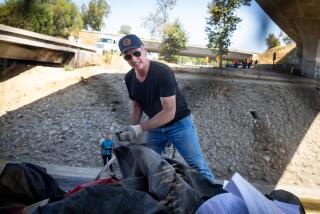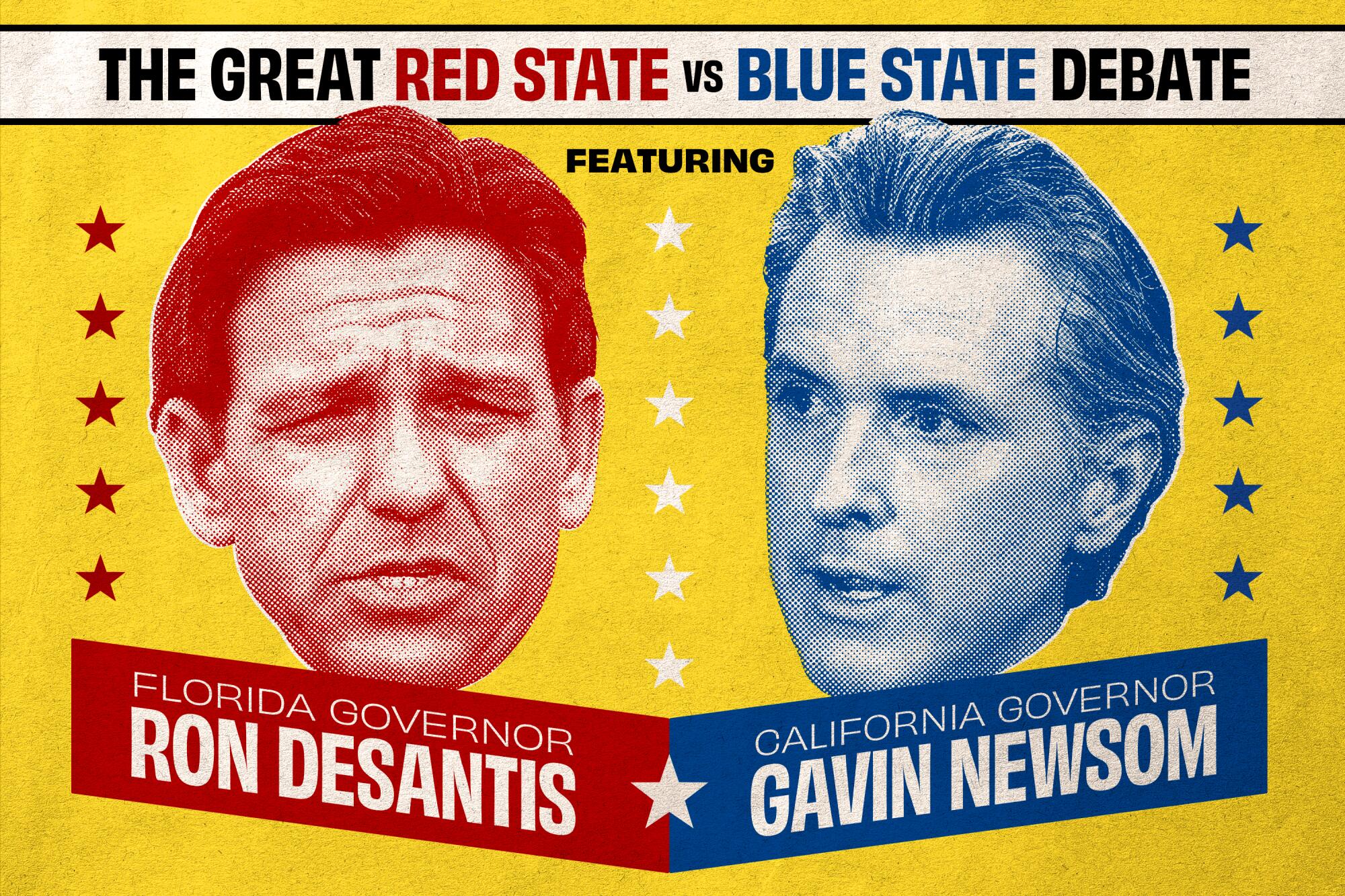
Your guide to understanding Newsom and DeSantis ahead of their Thursday debate — and how they are shaping life in California and Florida.
California Gov. Gavin Newsom and Florida Gov. Ron DeSantis will meet Thursday for an unusual debate focused on how the two huge states reflect America’s political divide. Because Democrats have all the power to shape state laws in California, while Republicans dominate policymaking in Florida, the states will be scrutinized by Fox News debate host Sean Hannity as examples of what’s possible when a state government is run by one political party.
The differences show up in how the two states approach abortion, guns, healthcare and more. For DeSantis, the debate is an opportunity to reinvigorate his floundering presidential campaign with Republican primary voters. For Newsom, who is not running for president next year but is widely seen as a potential candidate in 2028, it’s a chance to build his national image as a fighter for the left.
Here’s a breakdown of who Newsom and DeSantis are, and how they’re using their power to deepen America’s blue state-red state divide.
PERSONAL
Career highlights
Newsom
Democrat. Age 56. Elected California governor in 2018. Served as lieutenant governor 2011-2019 and San Francisco mayor 2003-2011. Owner of the PlumpJack Group which runs several restaurants, wineries and resorts.
DeSantis
Republican. Age 45. Elected Florida governor in 2018. Represented Florida in Congress 2013-2018. Served active duty in the U.S. Navy 2004-2010. Attorney who graduated from Harvard Law School in 2005 and is a member of the Florida Bar.
Family
Newsom
Married to Jennifer Siebel Newsom, a documentary filmmaker. Four children: Montana, Hunter, Brooklynn and Dutch.
DeSantis
Married to Casey DeSantis, a television news anchor. Three children: Madison, Mamie and Mason.
Baseball highlights
Newsom
Attended Santa Clara University on a partial baseball scholarship as a pitcher. Newsom hurt his arm and stopped playing after his sophomore year. He has said that playing baseball helped him battle dyslexia by giving him “some self-esteem and confidence.”
DeSantis
As a child, DeSantis was a member of a Dunedin, Fla., team that made it to the quarterfinals of the 1991 Little League World Series. He later captained the Yale University baseball team, batting .336 his senior year.
— Laurel Rosenhall and Benjamin Oreskes
POLICY

Abortion
Newsom
Newsom and his fellow Democrats in the Legislature sprang into action after the reversal of Roe vs. Wade to ensure that California would have among the nation’s most expansive reproductive health laws.
Newsom promoted a ballot measure last year in which voters overwhelmingly supported codifying abortion protections in the state constitution. He has stockpiled abortion pills — which are easily accessible in California — in the face of federal uncertainty. He has signed dozens of bills that aim to make California a “sanctuary state” for abortion seekers struggling to find care in other parts of the country.
He has also signed legislation that shields California providers from being penalized for mailing abortion pills to patients living in states where the procedure is banned.
Ahead of the debate, Newsom released an ad specifically attacking DeSantis’ abortion restrictions in Florida, signaling that the issue is key to their political rivalry.
DeSantis
This year, DeSantis signed a bill into law that bans abortion in Florida after six weeks of pregnancy — among the country’s strictest standards, as many women do not know they’re pregnant until after that point.
The bill, called the Heartbeat Protection Act, includes some exceptions for abortion seekers whose lives are at risk or are victims of rape, incest or human trafficking.
DeSantis had stopped short of calling for Congress to issue a federal ban on abortion, saying it should be up to states but said during a debate last month that he’s open to supporting a 15-week national ban.
The Florida law imposes a felony penalty for “any person who wilfully performs or actively participates in” a prohibited abortion. DeSantis has argued that the law applies to medical practitioners and will not be used to jail Florida women for having abortions.
— Mackenzie Mays

Guns
Newsom
California has the nation’s strongest gun control policies — including universal background checks, robust red-flag laws and bans on assault weapons — and Democratic state lawmakers propose additional restrictions every year.
Newsom has made gun control a pillar of his political career, dating to a 2016 ballot measure he proposed that expanded background checks for ammunition purchases and banned large-capacity magazines.
More recently, Newsom signed a since-overturned law modeled after Texas’ vigilante abortion bill, and others that strengthened the state’s concealed-carry rules and added a new tax on firearm and ammunition sales. The governor is pushing for an amendment to the U.S. Constitution that would require universal background checks on gun purchases, raise the federal minimum age to purchase a firearm from 18 to 21, institute a waiting period for gun purchases and prohibit the sale of assault weapons. The long-shot proposal could be considered only if two-thirds of states vote in favor of a constitutional convention.
DeSantis
Unlike most Southern states, Florida has passed some firearm restrictions that have earned it accolades from gun violence-prevention groups such as Giffords Law Center. Following the 2018 school shooting at Marjory Stoneman Douglas High School that killed 17 people, state lawmakers approved a slate of reforms, which included raising the minimum age to purchase a gun to 21, implementing a three-day waiting period to buy a firearm and temporarily restricting those who pose a risk to themselves or others from possessing firearms.
Since then, DeSantis signed a law that allows gun owners to carry concealed firearms without first obtaining a government-issued permit, prompting outcry from gun-control advocates and celebrations from 2nd Amendment groups.
— Hannah Wiley
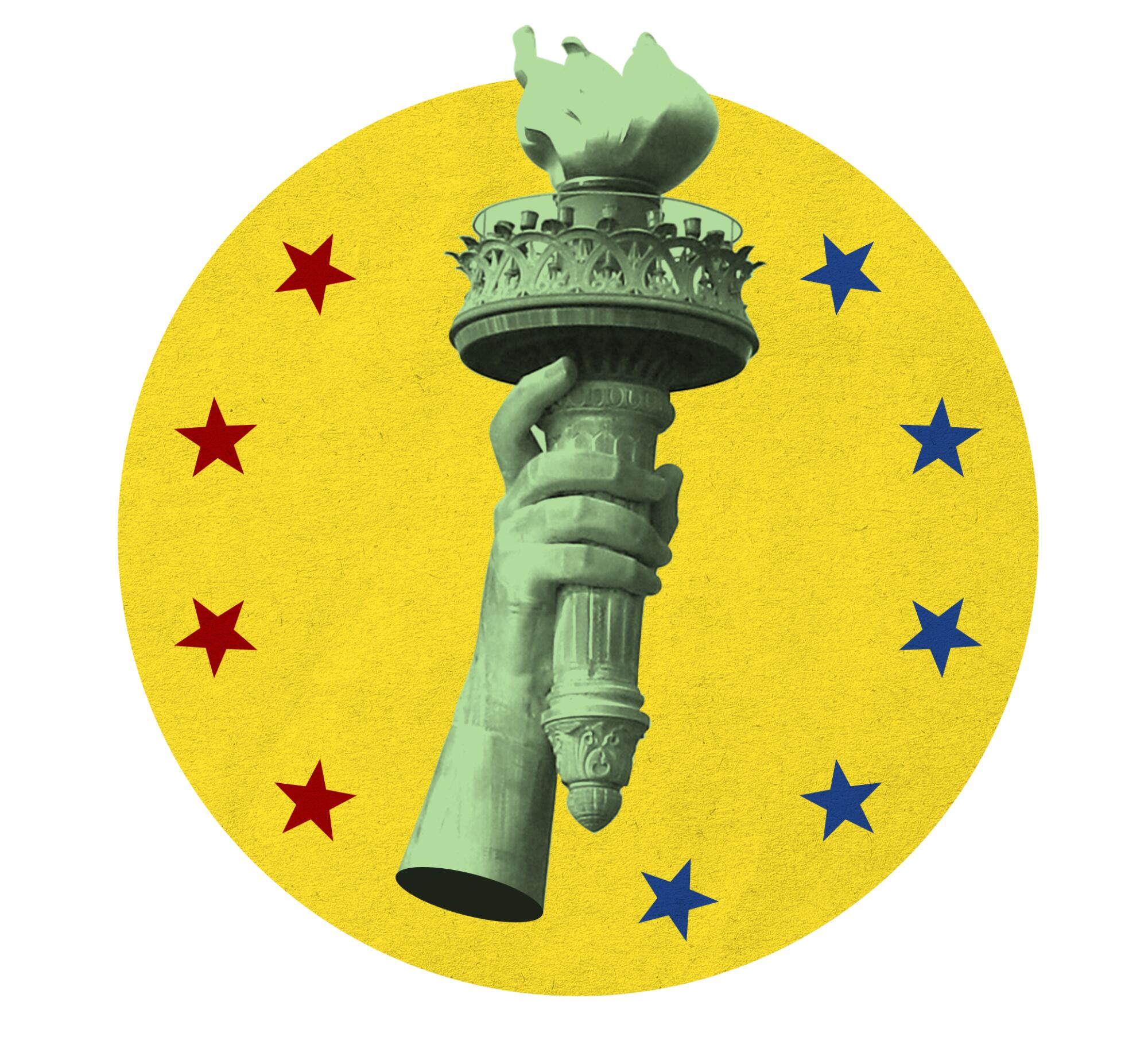
Immigration
Newsom
As governor, Newsom has increased protections in California for immigrants who reside in the country illegally, signing bills that allow them to serve on government boards and expand their access to college.
Under his leadership, California became the first in the nation to provide Medicaid benefits to people residing in the country illegally. Amid a feud with the Trump administration, he signed a law that prohibits arrests in courthouses over immigration violations.
When DeSantis chartered flights of out-of-state migrants to Sacramento in a display meant to critique California’s pro-immigrant policies, Newsom threatened him with kidnapping charges. Newsom called DeSantis “a small pathetic man” over the matter and the flights he ordered a “desperate” and cruel political stunt.
The California Department of Justice is investigating the incident, and Newsom and Atty. Gen. Rob Bonta have called on federal officials to do the same.
DeSantis
California was not the only target of DeSantis’ chartered migrant flights. His state budget set aside money to be used for a so-called relocation program that moves migrants to sanctuary cities.
Last year, he used that funding to transport Venzuelans seeking asylum in Texas to Martha’s Vineyard in Massachusetts, where Democrats support more welcoming immigration policies than those touted by red state leaders. DeSantis has claimed the program is voluntary, but migrants have said they were misled or coerced into relocating.
DeSantis has slammed the immigration policies of Newsom and President Biden, and has called for closed borders and the creation of a “border wall.”
Earlier this year, the Florida governor signed sweeping legislation that invalidated government identification for those without permanent legal residency and tightened rules on employer immigration policies and penalties for transporting immigrants into the state illegally. The law stoked fear across Florida’s immigrant communities, and was touted by DeSantis as “the strongest anti-illegal immigration legislation in the country.”
— Mackenzie Mays

Healthcare
Newsom
California has gone beyond other states in opening up Medi-Cal, its version of Medicaid, to low-income people who are in the country illegally. The added eligibility is not paid for by the federal government. And the next group that will become eligible for health insurance in January — undocumented low-income adults from age 26 to 49 — will cost the state an estimated $2 billion a year. California’s rate of uninsured people under 65 years old – 7.5% – is lower than the national average.
DeSantis
Florida is one of only 10 states that has not expanded Medicaid as part of the 2010 Obamacare law, declining federal matching money that would have covered much of the cost. A spokesperson told The Times earlier this year that DeSantis views Medicaid as “a true safety net program focused on low-income children, parents, pregnant women and elderly, as well as disabled individuals.” Florida’s rate of uninsured people under 65 — 13.9% — is the fourth-highest in the country.
— Noah Bierman

Housing and homelessness
Newsom
DeSantis has taunted Newsom over California’s homelessness crisis, releasing an ad earlier this year in which he claimed he saw people using drugs and defecating on the streets of San Francisco because of “leftist policies.” California has the country’s largest population of unhoused people in both raw numbers and per capita. Newsom has spent billions trying to solve the problem, to little avail, and promised earlier this year that the state would cut the number of unsheltered people by 15% in two years.
DeSantis
Many Florida cities have experienced skyrocketing rents as the population continues to grow. But Florida’s homeless population of about 26,000 in 2022 put the state in the middle of the pack nationally on a per capita basis. In fact, the state had one of the largest decreases in its homeless population (46%) between 2007 and 2022.
— Noah Bierman

Subscribers get exclusive access to this story
We’re offering L.A. Times subscribers special access to our best journalism. Thank you for your support.
Explore more Subscriber Exclusive content.

Education
Newsom
Newsom supports the California law that requires students receive instruction that explains the “role and contributions” of among others, “lesbian, gay, bisexual, and transgender Americans.”
Newsom strengthened those provisions by signing legislation that could result in fines for districts that ban state-approved textbooks because they portray LGBTQ+ people and other historically marginalized groups. He supports deep and wide-ranging discussion of history, including how past injustices contribute to ongoing inequality.
When it comes to academic improvement, California’s philosophy is to support schools in need, emphasizing additional funding while tracking such markers as test scores, attendance and suspensions. Schools and districts are not singled out for failing to raise academic achievement.
DeSantis
DeSantis signed a law forbidding instruction on sexual orientation and gender identity through third grade. Florida under DeSantis also embraces a view of American history that discounts the possibility that past injustices, such as slavery and state-sanctioned segregation, have enduring effects into the present. This philosophy has prompted DeSantis and state education officials to reject the College Board’s Advanced Placement course in African American history and even math curriculums seen as too left-leaning.
Florida has an accountability system for schools that critics describe as punitive and simplistic, but that supporters consider to be clear and meaningful. Every school gets a letter grade based on annual state scores — with good marks based on either consistently high performance or notable improvement or both.
DeSantis also has strongly supported providing publicly funded scholarships, also called vouchers, that subsidize the cost for students to attend private schools — a program that California lawmakers and voters have repeatedly rejected.
— Howard Blume

Economy
Newsom
California’s economic growth in the Newsom era has been hampered by large layoffs in the tech sector, a slowdown in tourism, and high costs of living and doing business in California, which has spurred a greater flight of companies and people, including increasingly highly educated professionals. Even so, the state’s payroll employment overall is up 4.8% from January 2019 when Newsom took office, compared with 4.5% over the same period for the country.
All major sectors of the state’s economy, except retail trade, have recovered jobs lost during the pandemic. California remains the entertainment and tech capital of the world, though it is facing increasing challenges from other states, and signs of some thawing in U.S.-China relations are positive for the tourism industry and could also give a boost to investments. Climate change, however, is already taking a toll on California’s signature agricultural industry, and high business costs and income inequality, as well as lack of affordable housing, present significant long-term challenges to the state.
DeSantis
By the broadest economic measures, including total output, employment and personal incomes, Florida has outperformed California and the nation as a whole. It has benefited from robust migration from other states — on net well over a million since 2019 — strong ties to Latin America, and gains in educational attainment.
Since January 2019, Florida’s payroll employment has expanded by 10.6%, more than double the national average, led by growth in business and professional services. The state’s most recent unemployment rate was 2.8%, a full point lower than for the U.S. as a whole.
But beneath the surface, there are significant stresses in Florida’s economy. Its latest poverty rate, for 2022, was 12.7%, a half-point higher than California’s and 1.2 percentage points above the national rate. As well, under DeSantis’ watch, the share of Floridians under 65 going without health insurance last year was 22.1%, lower than only two other states.
— Don Lee

Population
Newsom
California’s population has decreased by more than 400,000 over the last five years that Newsom has been governor and data from the California Department of Finance project no population growth over the next four decades statewide. This would represent a marked departure for the state, which has experienced consistent population growth throughout its history.
Many people leaving are moving to states with a lower cost of living, including Florida, Arizona, Nevada and Washington. In an interview with Fox’s Sean Hannity in June, Newsom said population losses were “anomalous the last few years” and “have already slowed down.” Flat or declining population would have major negative implications for the state’s economy as the population continues to age, demographic experts say.
DeSantis
Florida’s population has increased by more than 750,000 over the last five years that DeSantis has been governor. In 2022, some 51,000 Californians moved to Florida, compared with 29,000 people who moved the other way. DeSantis blamed “leftist politicians imposing leftist ideology and delivering poor results” at a March speech in Simi Valley, but experts say housing affordability is the most significant reason for the trend.
Florida certainly has been able to build more housing than California: Between July 2020 and July 2022, the state added 4% to its housing stock, compared with just 1.6% in California during the same span. Florida ranked fourth in the country in housing gain during that period and continued to see population growth; California was 32nd and lost population.
— Terry Castleman

COVID-19
Newsom
California was the first state in the nation to issue a stay-at-home order in response to COVID-19, a decision health experts say delayed the worst surge of the pandemic for many months.
Newsom defended the use of vaccine-or-test mandates for state employees and mask mandates during the worst moments of the pandemic, tools that some health experts have credited for leaving the state with a low cumulative COVID-19 death rate among the nation’s four most populated states.
Newsom came under criticism during the pandemic, as some questioned the economic toll of the public health measures, the slowness by which schools reopened, and a dinner he attended at a fancy Napa Valley restaurant at a time he was urging social distancing.
In raw terms, California had the lowest per capita COVID-19 death rate among the nation’s four most populous states: 2,560 for every 1 million residents. Florida’s rate was 60% worse, with 4,044 COVID fatalities for every 1 million residents, according to a Los Angeles Times analysis of Johns Hopkins University data through early March, when the university ended its data tracking. Some experts, however, caution against comparing the states’ death rates with one another, given how different they are in terms of the age of their populations, overcrowded housing and the like.
DeSantis
Months into the pandemic, Florida began to adopt a more critical view of policies intended to keep COVID-19 transmission rates low, allowing restaurants and bars to operate with no limits. DeSantis also pushed to reopen the state’s schools early, and worked to ban efforts to require people to wear masks or be vaccinated. Generally, California’s schools had relatively long closures of in-person classroom learning, while Florida had low rates of closures.
DeSantis’ message on vaccines evolved from boasting about his state’s high vaccination rate among seniors in early 2021 to becoming a vaccine skeptic. In September, after the Centers for Disease Control and Prevention recommended virtually everyone get an updated inoculation, DeSantis’ surgeon general recommended that younger adults under 65 not get the vaccine. DeSantis said he would not let the CDC “use healthy Floridians as guinea pigs for new booster shots that have not been proven to be safe or effective,” a statement that counters strong evidence cited by federal agencies that they are safe and effective.
A strong pro-vaccine push in early 2021 resulted in a high initial vaccination rate for Florida’s seniors — 77% of the state’s seniors had completed their primary vaccination series, compared with 74% of California’s seniors by mid-June. But increasing skepticism of COVID vaccines by spring led to Florida losing ground among younger adults, where, by mid-June of 2021, 43% of Florida’s younger adults had completed their primary vaccination series, compared with 54% in California.
— Rong-Gong Lin II

Crime
Newsom
Since Newsom took office in 2019, crime has risen in California. In 2022, according to the FBI, violent crime increased 4% when compared with the previous year, and about 13% when compared with his first year in office in 2019. In the entire U.S., violent crime increased 1.7% in 2022 when compared with the previous year.
In response to coordinated smash-and-grab retail thefts, which received television news coverage nationwide, Newsom in 2021 set up a new unit within the California Highway Patrol to tackle the high-profile crimes. In August, Newsom announced he would “triple” resources in L.A. to target retail crime and in September, his office announced a $267-million investment to tackle retail crime, including money for 55 counties to hire more police officers.
The California governor has also supported criminal justice reform. Months after taking office, Newsom enacted a moratorium on the death penalty in California. In August 2022, he signed a bill that would seal conviction and arrest records for most convicts — but not sex offenders — after they complete their prison sentence and parole. DeSantis vetoed a similar bill in Florida that had bipartisan support.
DeSantis
DeSantis has made crime a central part of his presidential campaign, but his often repeated claim that Florida “crime rates are at their lowest point in half a century,” which he claims on his presidential campaign website, can’t be substantiated and has been questioned by experts.
Although his campaign has cited 2022 crime statistics, according to the FBI, which maintains the numbers, only 367 of 758 law enforcement agencies in the state — less than half — provided the FBI with crime numbers. According to the Marshall Project, a nonprofit news agency, Florida had the worst participation in FBI crime statistics of all 50 states.
To draw police to the Sunshine State, DeSantis in March announced bonuses to about 1,400 new police recruits. He has expanded Florida’s death penalty by signing a bill in April that would allow capital punishment in cases involving child rape. That same month, he repealed a law that would have required a unanimous jury verdict to sentence someone to death. To address the fentanyl crisis, in May 2022 he signed a bill that enhanced prison sentences for those convicted in the sale and distribution of opioids.
— Salvador Hernandez

Disney
Newsom
Newsom made a big splash by going to Disneyland’s first-ever Pride Night in June. “In California, we don’t just tolerate our diversity — we celebrate it and all the ways it makes us stronger,” Newsom said at the time. And in 2022, around the time the Disney World feuds were starting in Florida, Newsom encouraged the franchise to expand jobs to the West Coast.
DeSantis
Earlier this year, DeSantis made unlikely enemies with the Disney franchise. The feud began in 2022 when Disney spoke out against Florida’s “Don’t Say Gay” legislation, which banned discussions on sexual orientation for kids in kindergarten through third grade. Now, the governor is tied up in multiple lawsuits, including one from taxpayers and another from Disney, which sued him earlier this year in a fight over the company’s self-governing powers.
— Anabel Sosa
COMPARING STATES
1
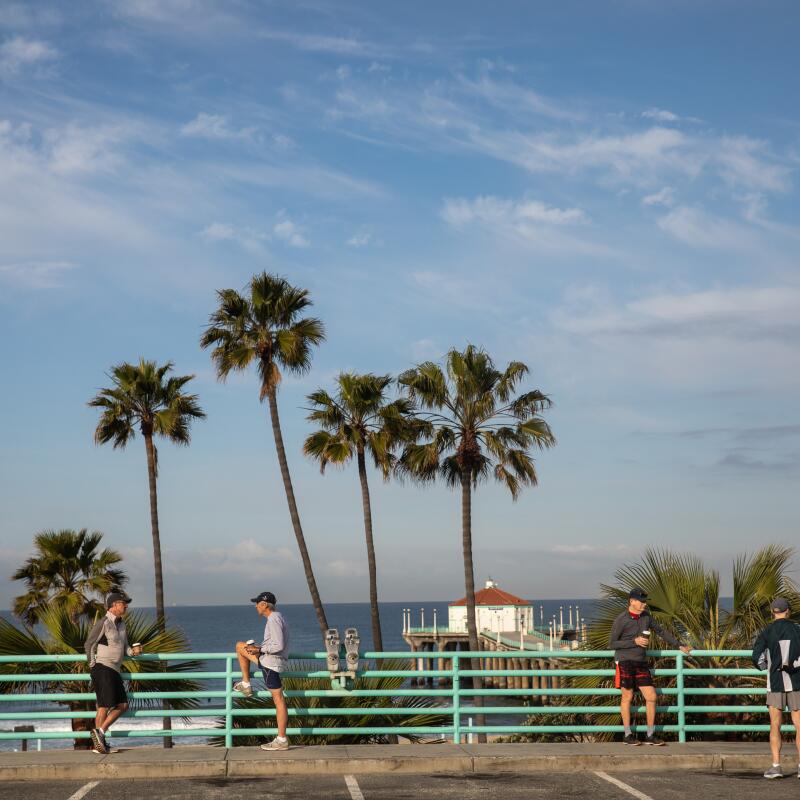
2
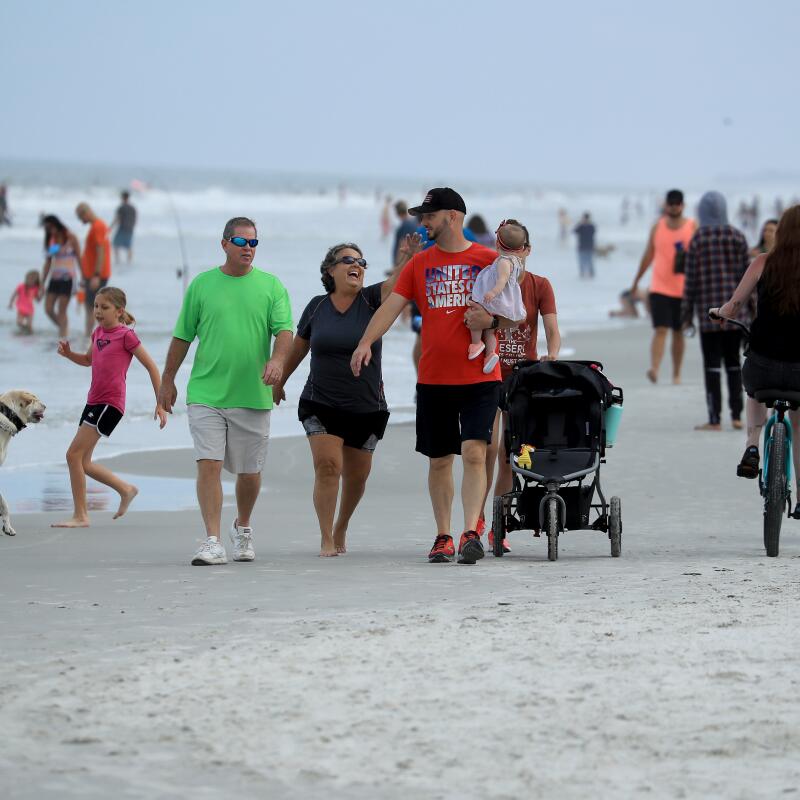
1. Manhattan Beach, CA. (Jay L. Clendenin/Los Angeles Times) 2. Jacksonville Beach, Florida. (Getty Images)
California
Population: 39.5 million
Median household income: $91,500
World Series wins: Dodgers, 6; Oakland Athletics, 4; San Francisco Giants, 3; Angels, 1
Electric vehicles: 903,600
Cost of a gallon of gas: $4.90
State income tax rate: 1% to 13.3%
Florida
Population: 21.5 million
Median household income: $69,303
World Series wins: Florida Marlins, 2
Electric vehicles: 168,000
Cost of a gallon of gas: $3.01
State income tax: Florida has no state income tax
More to Read
Sign up for This Evening's Big Stories
Catch up on the day with the 7 biggest L.A. Times stories in your inbox every weekday evening.
You may occasionally receive promotional content from the Los Angeles Times.
